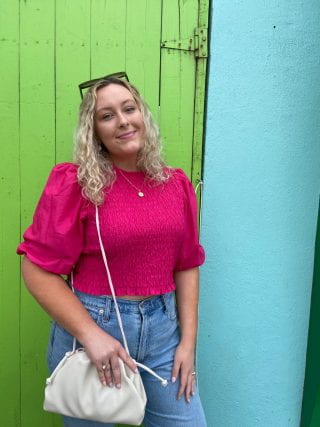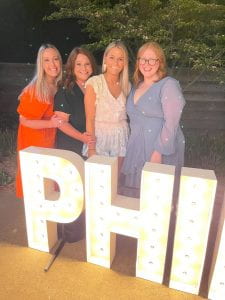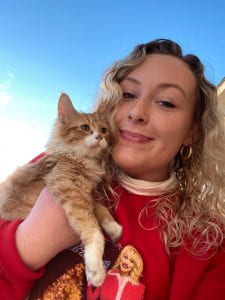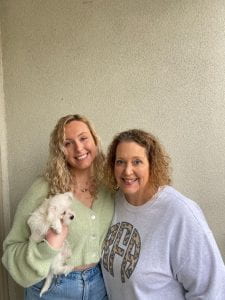A Q&A with Communication and Premed Senior Sara Feather

Sara Feather
Incoming Senior,
Communications Major with Minor in Biology and Medical Humanities
In this conversation, Feather talks about majoring in communications while being on the premed track to better communicate with her future patients; her passion for research on microgels to fight bacteria; three of her professors who are “the absolute BEST of the best;” her love of serving as the Panhellenic Delegate for Phi Mu and on the Student Alumni Board; and the importance of stepping outside of your comfort zone to create new connections!
Q: Tell us a little about your academic passions, research and/or what you studied within the college. What excites you about this?
Whenever I tell people I’m majoring in communications while premed, I usually get strange looks because it differs from the usual chemistry or biology route most aspiring physicians choose.
However, I think communication within health care is often overlooked. You could be the smartest person in the world, but if you cannot communicate effectively with your patients or coworkers – what is the purpose?
Years from now, I strive to better communicate with patients, so they are engaged and feel most comfortable in order to receive the best care.
As far as research, I joined The Striegler Lab last November and received the Summer Undergraduate Research Grant. With this grant, I am working on a project called “Microgel Synthesis and Evaluation as Antimicrobial Agents.”
To briefly summarize, there is an interest in creating new antimicrobial agents as bacteria resistance increases. Microgels are a considerable prospect because of their adaptability and ability to fight bacteria. We are able to synthesize microgels through monomers, such as butyl acrylate, and crosslinkers that we are testing in order to present microgels in a smaller, favorable size.
Microgel solutions are polymerized, sonicated, and extracted to understand the stability and sizing. Once the ideal microgel solution is created, we will determine the antimicrobial activity by exposing the microgels to Staphylococcus aureus.
This is exciting to me because I love the problem-solving aspect. In a normal teaching lab, you would take with a chemistry or biology course, if something goes wrong in an experiment, you get a few points taken off your grade and go on about your day. But in research, if an error appears we track to understand this problem and provide a solution.
Q: How long have you been at Fulbright College? What have you enjoyed most about your time here?
I have been a student at the Fulbright College for three years now.
What I have enjoyed most about my time is the people. I love to be a part of a college that has outstanding faculty, staff, and students!
Q: What has your favorite class been so far and why?
I have a few! Relating to the Department of Communication, I would have to say Interpersonal Communication with Dr. Aloia and Health Communication Campaigns with Mengfei Guan.
Both are incredible women who truly care for their students and want to see them succeed!
For my premedical courses, I am so glad I had the opportunity to take Organic Chemistry 1 with Dr. Striegler. Dr. Striegler has a great way of teaching a course that can otherwise often be intimidating to students.
This course was interesting, and I looked forward to going to her class each week. She has also been a mentor to me not only in research but advising me in professional and academic aspects as well.
In my opinion, these three professors are the absolute BEST of the best.
Q: What advice would you give to new students about to join the college?
Step outside of your comfort zone and create connections!
College can be a difficult time but surrounding yourself with a community to uplift yourself can make it so much easier.
I’ve found some of my best friendships through getting involved on campus. Join a registered student organization, Greek Life, or even just reach out to the people in your classes!
Also don’t view your failures as setbacks. Sometimes we can get so caught up in rejections or limitations and believe this is the end. It’s not – it is a lesson that will allow you to better yourself.
When one door closes, another will open.
Q: What do you like to do during your time outside of the university?
I love to be involved in different aspects of campus. Currently, I serve as the Panhellenic Delegate for Phi Mu and am a member of the Student Alumni Board.
I also serve as a volunteer for Arkansas Children’s Northwest Hospital and look forward to returning once the hospitals allows volunteers again!
When I’m not studying you can find me visiting places like Mount Sequoyah and Wilson Park with my friends or spending time with my rescue cat, Willow.
Q: When do you anticipate graduating, and what’s up next on the horizon for you?
 I plan to graduate in May of 2022. I’m currently in the process of applying to medical schools right now and will hopefully attend in fall 2022 to pursue my dream of becoming an OB/GYN!
I plan to graduate in May of 2022. I’m currently in the process of applying to medical schools right now and will hopefully attend in fall 2022 to pursue my dream of becoming an OB/GYN!
Q: Is there anything else you’d like to add or let readers know?
I am so thankful I decided to come to The University of Arkansas. These past three years have made Fayetteville feel like a home and I wouldn’t trade my experiences here for the world.
If any students have any questions concerning communications, the premedical track, getting involved on campus, or anything else – I would love to be a resource for you and try to help out!

